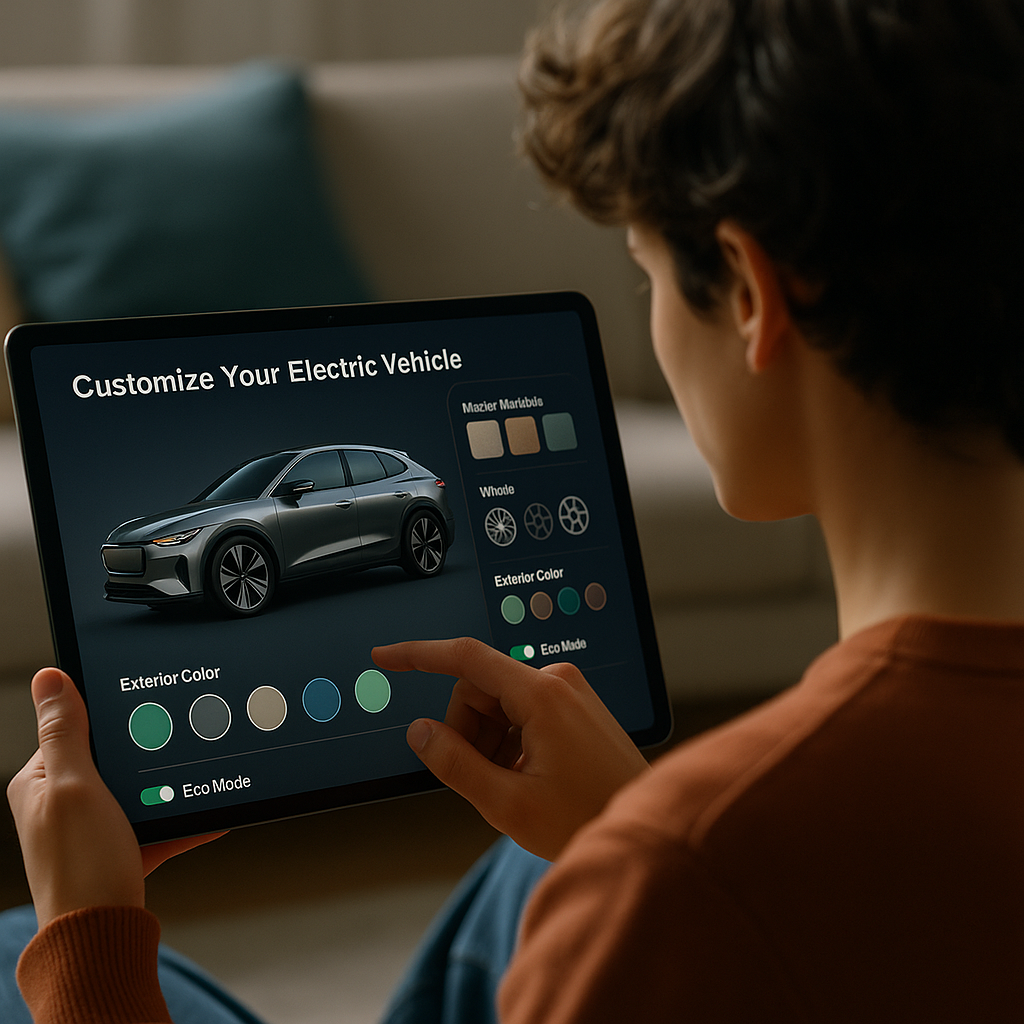Today's car buyers are reshaping the automotive industry, pushing it toward a new era of innovation and change. Gen Z buyers, born and raised in a fully digital world, are rewriting the rules of car ownership and forcing industry professionals to rethink how vehicles are marketed, sold, and used.
The consumers of today prioritise convenience, customisation, and transparency in their purchasing journeys, relying heavily on online platforms and digital tools to research, compare, and even purchase vehicles.
Their habits extend beyond a preference for digital-first shopping. Younger consumers are also placing a greater emphasis on sustainability, favouring electric and hybrid vehicles over traditional gas-powered options. Additionally, innovative mobility models such as car-sharing services and subscription plans are becoming increasingly attractive to this demographic, as they prioritise flexibility and affordability over long-term car ownership.
These trends are reshaping the future of automotive retail. To remain relevant, businesses in the automotive sphere must adapt to these new customer preferences by embracing digital transformation, promoting environmentally friendly options, and exploring alternative ownership models.
This blog takes a closer look at why younger buyers are likely to bypass traditional car-buying processes and what strategies the automotive industry can adopt to cater to this digitally driven, environmentally conscious generation. From online sales platforms to green vehicle investments, the industry is poised for a significant evolution.
Key Takeaways (TL;DR)
- Digital-first mindset: Younger buyers prefer online platforms for vehicle selection and purchase, valuing ease, transparency, and convenience over in-person dealership experiences.
- Mobility as a service (MaaS): There’s been a notable shift from ownership to flexible mobility options such as ride-sharing, car subscriptions, and pay-as-you-drive models.
- Sustainability focus: This generation favours eco-friendly transportation options, pushing the demand for electric vehicles (EV's) and other green initiatives.
- Personalisation over products: Younger buyers value tailored experiences and expect brands to deliver solutions that align closely with their preferences and lifestyles.
The Digital-first Generation Demands Seamless Online Experiences
Gone are the days when purchase decisions required multiple trips to dealerships and endless hours spent negotiating in person. Today’s modern consumers are reshaping the traditional sales model, favouring convenience, transparency, and online solutions that simplify the buying process. According to Salesforce, 79% of Gen Zers are eager for AI agents to find and recommend the best vehicle tailored to their needs, and 74% want AI to pinpoint the best time to buy a car based on price trends and sales.
Why the shift?
Born in the era of smartphones, social media, and 24/7 connectivity, this consumer base demands seamless, online-first experiences. They are used to having information and options at their fingertips, making convenience and efficiency a priority. Research shows that 90% of younger buyers start their car-buying journey online, exploring websites, virtual showrooms, comparison tools, and customer reviews before stepping foot into a dealership—if they even visit one at all. Digital research helps them narrow down options, compare prices, and even finalize financing online, making the entire process faster and more informed. This shift underscores the need for car sellers to adapt by offering robust digital experiences to stay competitive.
What this means for dealerships
- Virtual showrooms: Businesses need to invest in immersive virtual showrooms that allow customers to visually explore vehicle features in 3D.
- Mobile-first platforms: Optimised mobile experiences are critical, given the high screen time among tech-savvy buyers.
- Transparent pricing and financing tools: Today’s buyers want clarity on costs, with digital tools for financing calculations being a necessity.
Case in Point: Tesla revolutionised the traditional dealership sales model by introducing an entirely digital buying process. Customers can browse and configure their vehicles online, place an order, and even schedule delivery - all without ever setting foot in a physical showroom. This streamlined approach not only simplifies the car-buying experience but also showcases Tesla's commitment to innovation and efficiency in every aspect of its business.
READ MORE: Growing Trend of Online Vehicle Purchases
The Rise of Mobility as a Service
For Gen Z, owning a car is no longer viewed as a rite of passage. Instead, the priority has shifted towards having access to mobility solutions that eliminate the long-term burdens of vehicle ownership, such as maintenance, insurance, and depreciation. This generational shift is not just a trend but a fundamental change in how people approach mobility. Research indicates that Gen Z is creating an entirely new mobility culture, viewing cars as just one option among many for transportation, and showing a significant shift from ownership to usership models.
What is Mobility as a Service?
Mobility as a Service (MaaS) is a broad term that includes ride-hailing platforms like Uber and Lyft, car-sharing services such as Zipcar, and subscription-based car services. These solutions offer flexibility, cost savings, and convenience by removing the constraints of car ownership while still providing access to personal transportation. According to Deloitte, 43% of younger consumers express a stronger interest in MaaS models compared to buying vehicles outright, reflecting a growing preference for flexible options over traditional ownership.
Why it’s gaining traction
Several key factors explain the rapid adoption of MaaS among Gen Z consumers:
- Cost efficiency: By paying only for access rather than ownership, users can avoid ongoing costs like maintenance, insurance, and repairs—expenses that add up significantly over time. This is particularly appealing to younger professionals who prioritise budgeting and financial flexibility.
- Flexibility: MaaS services offer customisable plans, such as monthly subscriptions or pay-as-you-go rentals, catering to varying needs. Whether it’s daily commuting or the occasional weekend getaway, these options provide a level of adaptability that vehicle ownership cannot match.
- Urban convenience: With more young professionals living in densely populated cities, owning a car often feels like more of a hassle than a benefit. Parking scarcity, traffic congestion, and the rise of efficient public transport systems make MaaS an attractive alternative. Additionally, many cities are introducing environmental initiatives that prioritise shared and sustainable transport.
Implications for the industry
The rise of MaaS presents significant challenges and opportunities for the automotive industry:
- Rethinking business models: Traditional dealerships and manufacturers must adapt by integrating car subscription services into their offerings. This could involve bundling subscription options with new vehicle sales or developing wholly new platforms to deliver these services.
- Collaboration with tech companies: Partnerships with ride-hailing apps and car-sharing platforms will become essential for manufacturers looking to stay competitive in this changing landscape. By aligning with established mobility ecosystems, they can tap into new revenue streams.
- Pilot programmes and innovation: Original Equipment Manufacturers (OEMs) should experiment with subscription models and short-term ownership solutions in local markets. These pilot programmes can help gauge consumer interest, refine service offerings, and build the infrastructure needed to scale operations.
- Focus on sustainability: As MaaS aligns closely with environmentally conscious living, brands that emphasise sustainability and integrate electric or hybrid vehicles into their MaaS offerings will stand out to eco-minded consumers.
The growing appeal of MaaS signals a shift in how modern consumers view mobility and poses an urgent call for the industry to innovate. By rethinking traditional ownership models and embracing flexibility, automakers and service providers can capture the attention of a new wave of consumers who demand convenience, cost savings, and adaptability.
"By transitioning towards an access model, the automotive industry is aligning itself with the convenience-generation, where flexibility trumps longevity," says Mark Alvarez, Mobility Sector Analyst at Deloitte.

Download the free White Paper: Unlocking the Future of Vehicle Discovery with AI Agents
Sustainability and Ethical Choices Shape Buying Behaviour
Modern consumers see sustainability not as a fleeting trend, but as a fundamental lifestyle choice. Their demand for eco-conscious solutions has fueled a significant rise in interest in greener transport options, particularly electric vehicles (EV's). This environmentally aware group is reshaping the automotive industry, creating both challenges and opportunities for carmakers.
Environmental considerations
Moving away from fossil-fuel cars is a key priority for this eco-conscious demographic. 66% of Gen Z buyers actively seek brands with strong sustainability credentials when choosing a vehicle. This shift is driven by concerns over climate change, air pollution, and the need for cleaner energy sources. Modern consumers are not only looking for vehicles that reduce their carbon footprint but are also paying close attention to the production methods and overall impact of the brands they support.
The opportunity for carmakers
To meet this growing demand, automotive companies must take strategic action:
- Ramp up EV production: With interest in electric vehicles accelerating, carmakers need to expand their lineups to include a wider variety of affordable EVs. Offering diverse price points and options can make EV/s more accessible to younger audiences, helping to drive adoption.
- Green branding: Highlighting sustainability-focused initiatives, from offsetting carbon emissions to adopting circular production methods, can resonate strongly with this audience. Transparency in environmental practices can also build lasting trust.
- Collaborate with cities: Automotive brands can work with municipalities to establish EV-friendly infrastructure, such as increasing the number of accessible charging stations and implementing incentives for electric vehicle users. This partnership can ease the transition to EV's and encourage widespread adoption.
Case Study
Volvo has set a powerful example by committing to going fully electric by 2030, demonstrating leadership in sustainable transport solutions. The company is also exploring innovative ways to align with green values, such as using recycled materials for car interiors and upholstery, reducing waste in production, and focusing on renewable energy sources. Additionally, other brands are investing in similar initiatives, including creating battery recycling programs and reducing the dependency on rare earth materials in EV batteries.
As sustainability continues to take centre stage, carmakers have a unique opportunity to align with the values of the younger generation while redefining the future of transportation. By embracing green innovation and prioritising ethical practices, automotive brands can position themselves as leaders in the transition to a more sustainable future.
Personalisation Drives Loyalty
For tech-driven consumers, one size most definitely does not fit all. They’re not just purchasing a car—they’re looking for a highly tailored and engaging experience that aligns with their personal preferences. Brands that deliver these customised experiences are the ones building lasting trust and loyalty with this digitally savvy generation.
How personalisation impacts decisions
Personalisation goes far beyond marketing buzzwords. It’s about creating hyper-relevant marketing messages, offering customisable vehicles, and embedding personal preferences into every touchpoint of the customer journey. By doing so, brands foster a deeper connection with buyers, turning one-time customers into loyal advocates.
Ways personalisation impacts the industry
- Vehicle customisation: Gen Z consumers expect options. Features like custom interior designs, unique colour schemes, and software upgrades allow them to create a car that suits their lifestyle perfectly. Being able to personalise a vehicle makes the buying experience more meaningful.
- AI-driven recommendations: Leveraging data analytics, brands can predict and cater to individual needs. From suggesting timely servicing options to recommending feature upgrades, AI ensures that customers feel understood and valued.
- Personalised content: Engaging multimedia content, such as videos or interactive campaigns that show how specific features align with a buyer’s lifestyle, resonates far more than generic ads. It’s not just about selling a car - it’s about showing how the product fits seamlessly into their world.
The Role of Technology
The rise of AI and connected car technologies is reshaping how the automotive industry delivers personalisation. These advanced tools allow carmakers to gather and use valuable customer insights to enhance the overall experience. For instance, Ford uses connected systems to send proactive reminders about upcoming maintenance visits, helping drivers avoid breakdowns and keeping satisfaction levels high. Similarly, other manufacturers are integrating predictive technology to offer smarter, more personalised experiences at every stage of ownership. As technology evolves, personalisation will continue to redefine the car-buying journey, shaping the future of the automotive industry.
What the "Beyond Ownership Shift" Means for Automotive Brands
To thrive in an era where younger buyers continue pushing boundaries, disruptors like Tesla and innovative car subscription platforms have proven one thing: adapt early or risk irrelevance. Modern consumers are redefining the way they approach car ownership, favouring flexibility, sustainability, and advanced technology over traditional models. Companies that fail to keep up with these shifting preferences may find themselves falling behind in a rapidly changing market.
Industry Adaptation Checklist
Invest in digital ecosystems
Develop intuitive online touch points such as user-friendly websites, mobile apps, and AR-enabled virtual showrooms to enhance the customer journey and provide seamless digital experiences.
Participate in MaaS models
Explore car-sharing services, subscription partnerships, and other Mobility-as-a-Service (MaaS) solutions to cater to shifting consumer preferences for greater accessibility and flexibility.
Double down on sustainability
Commit to end-to-end eco-friendly solutions by prioritising sustainable materials, greener production methods, and reduced emissions to meet both regulatory standards and consumer expectations for a greener future.
Adopt personalisation tactics
Leverage AI and data analytics to predict customer needs, offering tailored solutions and memorable, personalized experiences that go beyond standard service offerings.
Look beyond transactions
Shift from a purely transactional approach to building lifelong customer relationships by reimagining dealership models into service-and-experience hubs that provide ongoing value and engagement.
Shaping the Future of Automotive
Gen Z consumers aren't just moving away from traditional car buying; they’re redefining it entirely. Instead of viewing car ownership as a necessity, many are embracing flexible alternatives like car-sharing services, subscription models, and other Mobility-as-a-Service (MaaS) offerings. This shift reflects a growing preference for digital-first platforms that allow for seamless, on-demand access to transportation. Sustainability and personalisation also rank high on their priority list, with a strong focus on eco-friendly options and tailored experiences that fit individual lifestyles.
For automotive brands, adapting to these rapidly evolving trends is no longer optional - it’s a critical survival strategy. To meet this new demand, the industry must take bold action, investing in innovative solutions that cater to these shifting preferences. Brands that act quickly and embrace this new mobility mindset will not only stay competitive but will position themselves as leaders in the future of transportation. The companies that fail to evolve risk being left behind as the mobility landscape continues to transform at an unprecedented pace.
Explore Our Latest Insights
Discover trends and innovations in the automotive sector.







